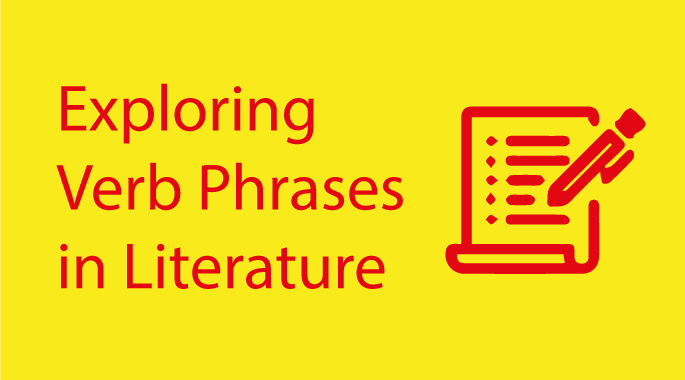Literature, in all its forms, is a breathtaking canvas of human expression. It’s where words transcend the mundane and become the brushstrokes of creativity, painting vivid pictures of emotions, actions, and experiences. At the heart of this artistic expression lies the often overlooked yet indispensable element – verb phrases in literature. In this exploration, we delve into the world of verb phrases in literary works, discovering how they enrich language and storytelling. Whether you’re an aspiring writer, a literature enthusiast, or simply curious about the nuances of language in literature, this journey promises to be both enlightening and captivating.

Table of Contents
The Artistry of Verb Phrases
Before we venture deeper into the world of literature, let’s understand the core of our subject – verb phrases. A verb phrase is not a mere grammatical construct; it’s the very pulse of expression. It’s where verbs, the action words, find their nuances and shades, transforming storytelling into an art form. In literary works, verb phrases are the brushes, painting the imagery, mood, and tone of the narrative.
Enriching Language and Imagery
Imagine a serene forest bathed in the soft glow of the setting sun. Now, picture the same scene with a “bird flies” versus “a solitary robin soared gracefully.” The first is plain and factual; the second, a vivid masterpiece. Verb phrases breathe life into words, allowing writers to create imagery so vibrant that readers can smell the damp earth and hear the wind rustling leaves.
Nuances and Emotions
Writers use verb phrases to imbue their characters and scenes with a spectrum of emotions. A “smile” becomes “a warm, radiant smile,” while a “tear” transforms into “a glistening tear of melancholy.” These subtle shifts turn characters into real people with complex emotions, making readers empathize and connect.
Building Suspense and Momentum
Literary masters know the magic of suspense. It’s a delicately woven tapestry, and verb phrases play a crucial role in literature. “He opened the door” becomes “He slowly, cautiously, opened the creaking door,” immediately setting the stage for anticipation. The reader’s heart races with every phrase, mirroring the character’s experience.
Unraveling a Masterpiece: “The Tell-Tale Heart”
As we’re on this journey, it’s fitting to dissect a literary classic, Edgar Allan Poe’s “The Tell-Tale Heart.” In this spine-chilling tale, verb phrases work like a sinister conductor of the narrator’s unraveling sanity. The constant “I heard many things” evolves into “I heard many things: many things more dreadful.” These phrases intricately build the narrator’s paranoia, making the reader a reluctant witness to madness.
Conclusion
In the realm of literary works, verb phrases are the unsung heroes. They breathe life, emotion, and anticipation into words, creating literary masterpieces. This journey through the art of expression reminds us that language, when wielded artfully, can transport us to worlds unknown and reveal the deepest corners of the human soul. Whether you’re a writer seeking to refine your craft or a reader hungry for the subtle beauty of storytelling, understanding the magic of verb phrases is your key to unlocking the full potential of literary works.
Interested in further literary insights? Explore our FAQs below.
FAQs: Unveiling the Secrets of Verb Phrases in Literature
Q. What’s the significance of verb phrases in literature and poetry?
Verb phrases in literature and poetry are like brushstrokes on a canvas. They add depth, emotion, and vivid imagery to poetic verses, making them more evocative and impactful.
Q. Can you provide examples of verb phrases in literature?
Certainly! In Shakespeare’s “Romeo and Juliet,” the phrase “Juliet appears above at a window” sets a romantic and dramatic tone, enhancing the scene’s impact.
Q. How can I use verb phrases to enhance my own writing?
To elevate your writing, focus on adding descriptive and emotionally charged verb phrases. They will bring your characters and scenes to life, making your storytelling more immersive.
Q. Do verb phrases in literature play a role in different genres?
Absolutely! Whether it’s poetry, prose, fiction, or non-fiction, verb phrases enrich the language and storytelling in various literary genres.
Q. Is it possible to overuse verb phrases in literature or writing?
While verb phrases in literature are essential, overusing them can make your writing verbose. Balance is key; use them judiciously to enhance your narrative without overwhelming it.
In the words of novelist Vladimir Nabokov, “The pages are still blank, but there is a miraculous feeling of the words being there, written in invisible ink and clamoring to become visible.” Verb phrases, with their subtlety and depth, hold the potential to reveal those invisible words in the most mesmerizing way.